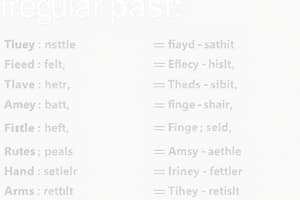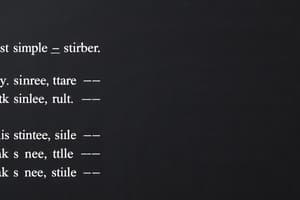Podcast
Questions and Answers
Which sentence correctly uses the past simple tense to describe a completed action?
Which sentence correctly uses the past simple tense to describe a completed action?
- I will visit Paris next summer.
- I visit Paris every summer.
- I am visiting Paris last summer.
- I visited Paris last summer. (correct)
What is the correct past simple form of the verb 'carry'?
What is the correct past simple form of the verb 'carry'?
- Carryd
- Carried (correct)
- Carryed
- Carry
Which of the following is an example of an irregular verb in the past simple tense?
Which of the following is an example of an irregular verb in the past simple tense?
- Ate (correct)
- Walked
- Played
- Talked
What is the correct structure for forming a negative sentence in the past simple tense?
What is the correct structure for forming a negative sentence in the past simple tense?
Which question is correctly formed in the past simple tense?
Which question is correctly formed in the past simple tense?
Which of the following time expressions is commonly used with the past simple tense?
Which of the following time expressions is commonly used with the past simple tense?
Which sentence demonstrates a series of completed actions in the past?
Which sentence demonstrates a series of completed actions in the past?
What is a common mistake when using the past simple tense?
What is a common mistake when using the past simple tense?
Which of the following verbs requires doubling the final consonant before adding '-ed' to form the past simple?
Which of the following verbs requires doubling the final consonant before adding '-ed' to form the past simple?
In which type of conditional sentences is the past simple tense often used?
In which type of conditional sentences is the past simple tense often used?
Choose the correct past simple form of the verb 'put'.
Choose the correct past simple form of the verb 'put'.
Which sentence correctly describes a past habit?
Which sentence correctly describes a past habit?
What вспомогательный verb is used to form questions in the past simple tense?
What вспомогательный verb is used to form questions in the past simple tense?
Which verb form should be used after 'did not' (didn't) in a negative past simple sentence?
Which verb form should be used after 'did not' (didn't) in a negative past simple sentence?
Which of the following is NOT a common time expression used with the past simple tense?
Which of the following is NOT a common time expression used with the past simple tense?
Which sentence correctly uses the past simple tense with a time expression?
Which sentence correctly uses the past simple tense with a time expression?
What should you do if a regular verb ends in '-e' when forming the past simple?
What should you do if a regular verb ends in '-e' when forming the past simple?
Which of these sentences uses the past simple correctly?
Which of these sentences uses the past simple correctly?
Which strategy is LEAST helpful for mastering the past simple tense?
Which strategy is LEAST helpful for mastering the past simple tense?
Why is it important to memorize irregular verb forms in the past simple tense?
Why is it important to memorize irregular verb forms in the past simple tense?
Flashcards
Past Simple Tense
Past Simple Tense
Describes completed actions at a specific time in the past, with no connection to the present. Used for narrating past events or stating historical facts.
Regular Verb Formation
Regular Verb Formation
Add '-ed' to the base form (e.g., walk -> walked). If the verb ends in '-e', add '-d' (e.g., bake -> baked).
Irregular Verbs
Irregular Verbs
Verbs that have unique past simple forms that do not follow the '-ed' rule and must be memorized (e.g., go -> went).
Completed Actions
Completed Actions
Signup and view all the flashcards
Series of Completed Actions
Series of Completed Actions
Signup and view all the flashcards
Past Habits or States
Past Habits or States
Signup and view all the flashcards
Definite Time in the Past
Definite Time in the Past
Signup and view all the flashcards
Positive Sentence Structure
Positive Sentence Structure
Signup and view all the flashcards
Negative Sentence Structure
Negative Sentence Structure
Signup and view all the flashcards
Question Structure
Question Structure
Signup and view all the flashcards
Time Expressions
Time Expressions
Signup and view all the flashcards
Common Mistakes
Common Mistakes
Signup and view all the flashcards
Irregular verb mistakes
Irregular verb mistakes
Signup and view all the flashcards
Mistakes with 'did'
Mistakes with 'did'
Signup and view all the flashcards
Study Notes
- The past simple tense, also known as the simple past, is used to describe completed actions that occurred at a specific time in the past
- These actions are finished and have no connection to the present
- It's a fundamental tense for narrating past events or stating historical facts
Formation
- For regular verbs, the past simple is formed by adding "-ed" to the base form of the verb (e.g., walk -> walked, play -> played)
- If the verb ends in "-e", just add "-d" (e.g., bake -> baked, smile -> smiled)
- For verbs ending in a consonant-vowel-consonant sequence (except those ending in -w, -x, or -y), double the final consonant before adding "-ed" (e.g., stop -> stopped, plan -> planned)
- If the final syllable of the verb is stressed, the final consonant is also doubled (e.g. admit -> admitted)
- If the final syllable of the verb is not stressed, the final consonant is not doubled (e.g. visit -> visited)
Irregular Verbs
- Irregular verbs have unique past simple forms that do not follow the "-ed" rule and must be memorized (e.g., go -> went, see -> saw, eat -> ate)
- There is no reliable rule to predict irregular verb forms; they must be learned individually
- Some verbs have the same form in the base form and the past simple (e.g. cut -> cut, hit -> hit, put -> put)
Use Cases
- Completed Actions: To express actions that started and finished in the past (e.g., "I visited Paris last summer.")
- Series of Completed Actions: Used to describe a sequence of events that occurred in the past (e.g., "I woke up, brushed my teeth, and had breakfast.")
- Past Habits or States: To indicate a habitual action or state that was true in the past but is no longer true (e.g., "I used to play the piano when I was younger.")
- Definite Time in the Past: Often used with adverbs or time expressions that specify when the action happened (e.g., yesterday, last week, in 2010)
- In conditional sentences (type II) to describe hypothetical situations (e.g. "If I won the lottery, I would travel the world")
Positive Sentences
- Structure: Subject + Verb (past simple form) + (Object/Complement)
- Example: She danced beautifully at the party.
- Example: They arrived late.
Negative Sentences
- Structure: Subject + did not (didn't) + Verb (base form) + (Object/Complement)
- Use "did" as an auxiliary verb followed by "not" to create the negative
- The main verb returns to its base form, as "did" already indicates past tense
- Example: I didn't eat breakfast this morning.
- Example: He didn't go to the concert.
Questions
- Structure: Did + Subject + Verb (base form) + (Object/Complement)?
- Start the question with "Did," followed by the subject and the base form of the verb
- Use "Did" to form questions; the main verb is in its base form
- Example: Did you see that movie?
- Example: Did they finish the project?
Time Expressions
- Time expressions help specify when the action occurred
- Examples include: yesterday, last week, last month, last year, ago (e.g., two days ago), in [year] (e.g., in 1999), when, then
- Using these time expressions can clarify the timing of the completed action
- Example: "I called her yesterday."
- Example: "They lived in London last year."
Common Mistakes
- Using the base form of the verb in positive sentences (instead of the past simple form)
- Incorrectly forming the past simple of irregular verbs
- Forgetting to use "did" in negative sentences and questions and failing to revert the main verb to its base form when using "did"
- Confusing the past simple with the past continuous tense
Tips for Mastering the Past Simple
- Practice regularly with exercises and examples; focus on both regular and irregular verbs
- Create sentences based on everyday past events
- Read texts in the past simple to see the tense used in context
- Memorize common irregular verbs
- Pay attention to time expressions used with the past simple to understand when to use it
- Use language learning apps and websites for practice
Studying That Suits You
Use AI to generate personalized quizzes and flashcards to suit your learning preferences.




